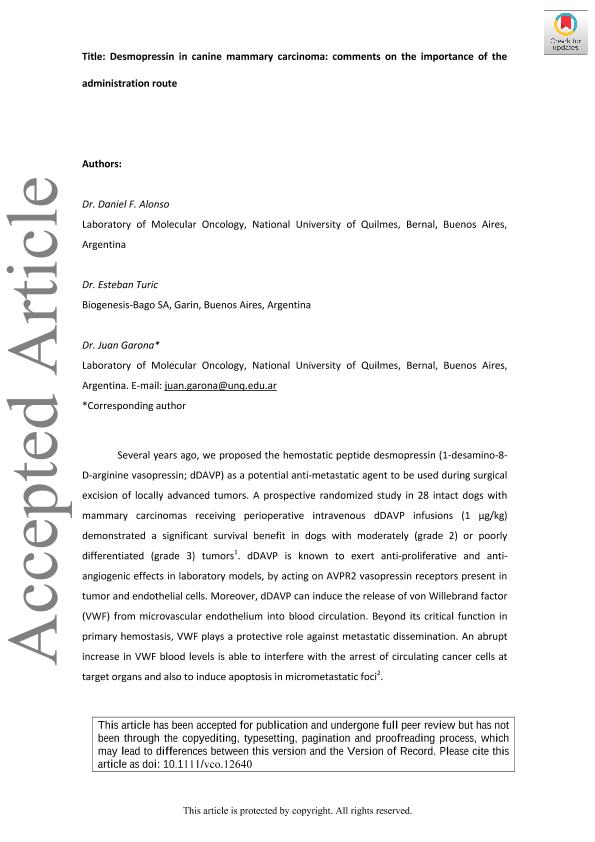Artículo
Desmopressin in canine mammary carcinoma: Comments on the importance of the administration route
Fecha de publicación:
09/2021
Editorial:
Wiley Blackwell Publishing, Inc
Revista:
Veterinary And Comparative Oncology
ISSN:
1476-5810
e-ISSN:
1476-5829
Idioma:
Inglés
Tipo de recurso:
Artículo publicado
Clasificación temática:
Resumen
Several years ago, we proposed the haemostatic peptide desmopressin (1-desamino-8-d-arginine vasopressin; dDAVP) as a potential anti-metastatic agent to be used during surgical excision of locally advanced tumours. A prospective randomized study in 28 intact dogs with mammary carcinomas receiving perioperative intravenous dDAVP infusions (1 μg/kg) demonstrated a significant survival benefit in dogs with moderately (grade 2) or poorly differentiated (grade 3) tumours.1 dDAVP is known to exert anti-proliferative and anti-angiogenic effects in laboratory models, by acting on AVPR2 vasopressin receptors present in tumour and endothelial cells. Moreover, dDAVP can induce the release of von Willebrand factor (VWF) from microvascular endothelium into blood circulation. Beyond its critical function in primary haemostasis, VWF plays a protective role against metastatic dissemination. An abrupt increase in VWF blood levels is able to interfere with the arrest of circulating cancer cells at target organs and also to induce apoptosis in micrometastatic foci.2 The article entitled “A prospective randomized trial of desmopressin in canine mammary carcinoma” recently published in Veterinary and Comparative Oncology by Sorenmo et al retested dDAVP as a surgical adjuvant in 24 dogs with mammary carcinomas.3 They reported that few dogs developed metastatic disease in this study, and no significant benefit of perioperative dDAVP administration was observed. We completely agree with the authors in the sense that subgroup comparisons between the high-risk subgroups were very underpowered, since none of the dogs with grade 2 tumours developed metastasis and only one dog with a grade 3 tumour was randomized to receive dDAVP.3 More to the point, all intact dogs underwent ovariohysterectomy as part of their treatment in this study, thus reducing the risk of metastasis and possibly diminishing the impact of perioperative dDAVP on survival. However, it is important to note that Sorenmo et al used a nasal spray formulation of dDAVP administered by the subcutaneous route,3 instead of an intravenous infusion as in our previous study.1 Even though subcutaneous administration is the standard of care in bleeding disorders, it was clearly demonstrated that dDAVP is ineffective by the subcutaneous route in experimental metastasis assays in mice. A clear dose-dependent anti-metastatic action was observed by using the intravenous injection (dDAVP doses ranging from 0.3 to 2 μg/kg), while no significant effects were obtained with similar doses by the subcutaneous route.4 Although a haemostatic factor such as VWF is involved, anti-metastatic effects of dDAVP are not directly associated with the coagulation process.4 VWF is a multifunctional protein and its role in resistance to metastasis is independent of its role in haemostasis,2 probably requiring the rapid peak concentrations associated with high intravenous doses to favour the elimination of early metastatic cells. Finally, we agree with the authors in that a prospective randomized trial in dogs bearing grade 3 mammary tumours should be conducted with the aim of resolving discrepancies between studies. However, in order to confirm the therapeutic benefits of perioperative dDAVP, compound should always be administered using the intravenous route. In this setting, maintenance therapy based on additional postoperative doses of dDAVP, or its synthetic analog with enhanced cytostatic activity [V4Q5]dDAVP,5 could be used to consolidate the effect against dormant metastasis or disseminated tumour cells.
Palabras clave:
PERIOPERATIVE DESMOPRESSIN
,
BREAST CANCER
,
AVPR2
,
DRUG REPURPOSING
Archivos asociados
Licencia
Identificadores
Colecciones
Articulos(SEDE CENTRAL)
Articulos de SEDE CENTRAL
Articulos de SEDE CENTRAL
Citación
Alonso, Daniel Fernando; Turic, Esteban; Garona, Juan; Desmopressin in canine mammary carcinoma: Comments on the importance of the administration route; Wiley Blackwell Publishing, Inc; Veterinary And Comparative Oncology; 19; 3; 9-2021; 409-410
Compartir
Altmétricas




